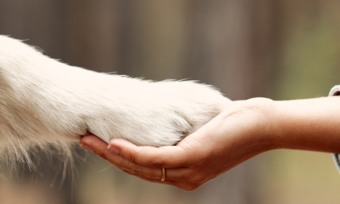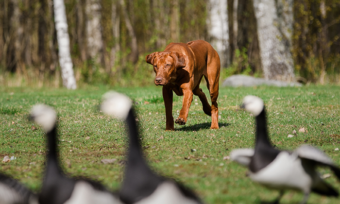
1. Green-cheeked conure
Small in size but big in personality, green-cheeked conures are excellent exotic birds for apartment dwellers. These playful birds have charisma by the bucketload and love to engage with their owners. Curious and gentle, conures can be trained to talk, as they have a wide range of vocalisations to chatter away.
Green-cheeked conures are native to the forests of South America and are known for their vibrant colour.
Green-cheeked conure tips
- Keep their intelligent minds busy to help avoid separation anxiety
- Provide them with a spacious cage with plenty of toys and perches
- Green-cheeked conures require a balanced diet of fresh fruit, vegetables, nuts and seeds
- Always provide fresh water and change it once a day
- Repeat worming every three months with a broad-spectrum bird wormer
2. Hermit crab
A quirky and entertaining choice, hermit crabs are some of the lowest maintenance pets for apartments. But be prepared for a long-term commitment, as they can live for up to 15 years if taken care of properly.
Hermit crab tips
- Hermit crabs can eat a variety of foods but don’t skimp on quality, nutritionally balanced pellets
- These crustaceans need a warm living environment (22-27°C)
- Run a fluorescent or LED bulb in their tank for 8 to 12 hours a day to mimic natural light cycles
- Provide your hermit crab with enough sand to bury themselves so they can safely moult
3. Tropical fish
A gently bubbling aquarium full of colourful pet fish is a wonderful addition to any apartment, which is why they feature on our ‘lowest maintenance pets for apartments’ list. Tropical pet fish come in loads of shapes, sizes, and vibrant colours so you can create your own unique underwater world.
Some species of pet fish go better together than others, so do your research before combining varieties. For example, semi-aggressive species like Angel Fish and Tiger Barbs require more planning.
Tropical fish tips
- Consider the type, quantity and eventual size of the pet fish you’ll keep
- The ideal temperature for most tropical fish is between 24-28°C
- Specialised water heaters and filters are important in creating an optimum environment for tropical fish
- Tropical tanks for pet fish require regular cleaning and equipment maintenance
- Keep tanks away from windows and direct sunlight to avoid spiking water temperature
4. Long-neck turtle
A long-neck turtle makes for a unique and fascinating pet that is a guaranteed talking point when your friends come over.
Long-neck turtle tips
- Keep the tank clean (by ideally cleaning it every other day) to keep the water from fouling or algae building up
- Keep a calcium block in the aquarium. It’ll reduce the acidity of the water and help the shell stay healthy
- Provide water at least 15cm deep and increase it as your long neck turtle grows
- It’s best to give long neck turtles some plant material daily, like water weeds or lettuce
- Turtles need a good quality filter and aquarium heater since water quality and temperature directly affect their health
5. Rat
We know that the very word rat might send a shiver up your spine but hear us out: rats can make wonderful pets for NZ apartment living.
Pet rats are intelligent and can be trained to do tricks just like a dog even in NZ apartments. They’re gentle, rarely bite, and love to be patted and handled.
Despite the reputation of their pesky free-roaming counterparts, pet rats are clean animals that groom themselves much like a cat and will do so in your NZ apartment too.
Rat tips
- You’ll need an enclosure with some climbing and playing equipment
- Spend at least half an hour a day interacting with your pet rat as they’re very sociable critters
- Rats are nocturnal so they’ll sleep the day asleep while you’re out and about
- Suitable substrates for pet rats include bedding, fleece fabric, recycled newspaper and shredded paper
- Rats are omnivores so they do well eating high-quality pellets with fresh vegetables, fruits, and lean animal meat like chicken

6. Guinea pig
Guinea pigs are a great option as indoor pets. They’re low maintenance, inexpensive and incredibly lovable. Plus, they’re easy to care for and don’t need lots of space. With a small hutch or cage, they can live comfortably in an apartment.
Guinea pig tips
- Guinea pigs have sensitive respiratory tracts so cages should be well-ventilated to prevent respiratory disease
- The height of the cage isn’t as important but some guinea pigs like ramps and multiple levels
- Guinea pigs are messy and may even relieve themselves in food dishes so proper hygiene is a must
- It’s hard for guinea pigs to handle heat and humidity. The temperature should never go over 80°C and humidity should stay between 40-70%
- They have a pretty high metabolic rate and need to eat almost constantly. Also, their diet should never include animal protein since they’re strict herbivores
7. Rabbit
Rabbits make great pets for people living in apartments as they are low maintenance and easy to care for. Rabbits don’t need a lot of space to live comfortably and they don’t require a lot of attention, making them an ideal pet for those who don’t have a lot of extra time on their hands.
Rabbit tips
- Feed your rabbit a balanced diet consisting mainly of hay, fresh vegetables and a small portion of pellets
- Rabbits need regular exercise to stay healthy. Allow your rabbit supervised time outside of their enclosure to hop around and explore. You want to make sure the area is safe and there aren’t any hazards lying about
- Rabbits need social interaction to thrive so pet, groom and play with them
- Keep your rabbit mentally stimulated by providing toys, tunnels and cardboard boxes for them to play with and explore. Keep things fresh by rotating toys to prevent boredom
- Rabbits can be litter trained, just like cats. Make sure your rabbit is using a litter box filled with rabbit-safe litter, like paper-based or aspen shavings. Remember to regularly clean the litter box
8. Ragdoll cat
If you’re looking for an ideal pet for an apartment, you can’t go wrong with a Ragdoll cat. Ragdoll cats are known for their laid-back and easy-going personalities, making them a perfect fit for NZ apartment living (try to keep your pet rats away from them though!).
Ragdoll cat tips
- With such lush long fur, Ragdoll cats look beautiful but need to be groomed. Brush their coat to keep it healthy and prevent it from getting matted as this can lead to hairball problems
- Ragdolls are known for their calm and gentle nature. They tend to be less active and more laid-back compared to some other cat breeds. So, this makes them well-suited for apartment living where space may be limited as they are content to spend most of their time indoors and enjoy a relaxed lifestyle
- Ragdoll cats can be prone to heart and gum disease so be sure to give them and you a safeguard with cat insurance
- While it’s important to provide adequate space and environmental enrichment for any cat, Ragdolls can adapt well to smaller living spaces such as apartments. If they have access to toys, scratching posts and vertical spaces to climb, they can happily thrive within the confines of an apartment
- Ragdolls are known for their affectionate and social personalities. They often enjoy being close to their human companions, seeking out attention and even following them around the apartment.
9. Shih Tzu dog
Are you living in an apartment and looking for a pet to keep you company? Look no further than the Shih Tzu. This small, low maintenance dog is a great fit for apartment living.
Shih Tzu tips
- Shih Tzus are small dogs, typically weighing between 4-7kg. Their compact size makes them well suited for apartment living as they require less space compared to larger breeds
- Shih Tzus have relatively low exercise needs. While they still require regular walks and playtime, they don’t have the high energy levels or exercise demands of some other breeds. A couple of short walks and indoor play sessions each day can usually fulfil their exercise needs, which can be easily managed in an apartment setting
- You should bathe your Shih Tzu at least every three weeks and brush their coats every day (long fur), second day (medium length fur) or third day (short fur)
- When it comes to health, this breed can be prone to respiratory, heart, eye, hair, skin and ear issues so be sure to choose the appropriate level of dog insurance cover
- Shih Tzus are not generally known to be excessive barkers. While they may alert you to visitors or noises, they’re not as prone to continuous barking. This can be beneficial in apartment living situations where noise levels need to be kept to a minimum

Keeping your pet safe
One of the most common pet poisons found in the home are household cleaners and detergents. Though they may not seem dangerous, they can be toxic to pets if ingested, leading to vomiting, diarrhea and other intestinal issues.
To keep your pet rats, long neck turtles, cats, dogs and other creatures safe from harm, make sure to store all cleaners and detergents in secure, locked cabinets in your apartment and out of reach.
Compare pet insurance providers here!
About the reviewer of this page
This report was reviewed by Canstar Content Producer, Caitlin Bingham. Caitlin is an experienced writer whose passion for creativity led her to study communication and journalism. She began her career freelancing as a content writer, before joining the Canstar team.
Enjoy reading this article?
You can like us on Facebook and get social, or sign up to receive more news like this straight to your inbox.
By subscribing you agree to the Canstar Privacy Policy







Share this article